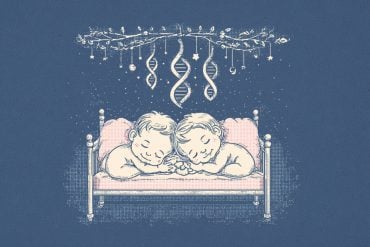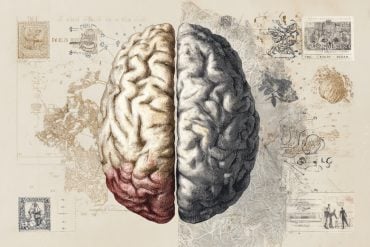Summary: A new study reports Holocaust survivors who suffer from PTSD and their adult children age less successfully and display more unhealthy behaviors than those with no PTSD or who did not experience the horrors of the Holocaust.
Source: Bar-Ilan University.
A new study on intergenerational transmission of trauma has found evidence that Holocaust survivors suffering from post-traumatic stress disorder and their adult offspring exhibit more unhealthy behavior patterns and age less successfully in comparison to survivors with no signs of PTSD or parents who did not experience the Holocaust and their offspring..
Now that they are mostly middle aged or older adults, offspring of Holocaust survivors may be assessed to determine whether ancestral trauma lingers on to affect their aging process. The results can provide important data not just about Holocaust survivors and their offspring, but also in general about aging individuals who were exposed to massive trauma.
Prof. Amit Shrira, of Bar-Ilan University’s Interdisciplinary Department of Social Sciences, studied more than 187 dyads of parents, including some who survived the Holocaust and some who weren’t exposed to the Holocaust, and their adult offspring (374 individuals in total).
Shrira found that Holocaust survivors with signs of PTSD and their offspring reported more unhealthy behavior, such as smoking, alcohol consumption, and lack of physical activity, compared to those with no signs of PTSD or no exposure to the Holocaust and their offspring. Additionally, Holocaust survivors with signs of PTSD and their offspring reported more medical conditions and disability, which suggests a less successful aging process. The results were recently published in the journal Psychiatry Research.
“There is much evidence that traumatic exposure can mold the way survivors’ age. Holocaust survivors who suffer from PTSD tend to engage in unhealthy behavior and transmit this behavior to their offspring, which influences their health and functioning in later years,” said Shrira.

What causes the intergenerational transmission of trauma is still unclear, but Shrira says there is initial evidence that biological mechanisms are involved in the process.
The majority of offspring of Holocaust survivors developed into fully functioning and healthy people, according to Shrira, but specific groups at higher risk of developing mental and physical morbidity must be pinpointed in order to offer them suitable interventions that will lessen their suffering.
The current findings suggest that unhealthy behaviors should be assessed among offspring of Holocaust survivors, especially among those whose parents suffer from PTSD, and this carries important clinical implications. Screening of offspring patients should cover cigarette use, alcohol consumption, drug use, exercise and eating habits. In cases where unhealthy behaviors are identified, practitioners should provide information about related health risks and initiate treatment to interrupt negative health behaviors.
Source: Elana Oberlander – Bar-Ilan University
Publisher: Organized by NeuroscienceNews.com.
Image Source: NeuroscienceNews.com image is in the public domain.
Original Research: Open access research for “Parental PTSD, health behaviors and successful aging among offspring of Holocaust survivorse” by Amit Shrira in Psychiatry Research. Published January 212 2019.
doi:10.1016/j.psychres.2018.11.060
[cbtabs][cbtab title=”MLA”]Bar-Ilan University”Parental PTSD Affects Health Behavior and Aging Among Offspring of Holocaust Survivors.” NeuroscienceNews. NeuroscienceNews, 22 January 2019.
<https://neurosciencenews.com/holocaust-ptsd-epigenetics-health-10611/>.[/cbtab][cbtab title=”APA”]Bar-Ilan University(2019, January 22). Parental PTSD Affects Health Behavior and Aging Among Offspring of Holocaust Survivors. NeuroscienceNews. Retrieved January 22, 2019 from https://neurosciencenews.com/holocaust-ptsd-epigenetics-health-10611/[/cbtab][cbtab title=”Chicago”]Bar-Ilan University”Parental PTSD Affects Health Behavior and Aging Among Offspring of Holocaust Survivors.” https://neurosciencenews.com/holocaust-ptsd-epigenetics-health-10611/ (accessed January 22, 2019).[/cbtab][/cbtabs]
Abstract
Parental PTSD, health behaviors and successful aging among offspring of Holocaust survivors
Unhealthy behaviors and physical morbidity are more common among trauma survivors, especially those who suffer from posttraumatic stress disorder (PTSD). This study looked at the underexplored relationships between parental PTSD, unhealthy behaviors and aging of trauma survivors’ offspring. Dyads of parents (mean age = 82.42) and offspring (mean age = 55.48) reported PTSD symptoms, health behaviors and completed indices of successful aging. Dyads were divided into three groups: Holocaust survivors (HS) with probable PTSD (n = 28 dyads), HS without PTSD (n = 86 dyads) and comparison parents without PTSD (n = 73 dyads). Relative to the other groups, HS parents with probable PTSD and their offspring reported more unhealthy behaviors. Serial mediation models showed that the effect of parental PTSD on offspring successful aging was mediated by both parental and offspring unhealthy behaviors. Findings remained significant after controlling for background characteristics and offspring PTSD. This study provides preliminary evidence that PTSD is related to unhealthy behaviors across generations in HS families. Possible mechanisms for such intergenerational effect and its clinical implication are discussed.







